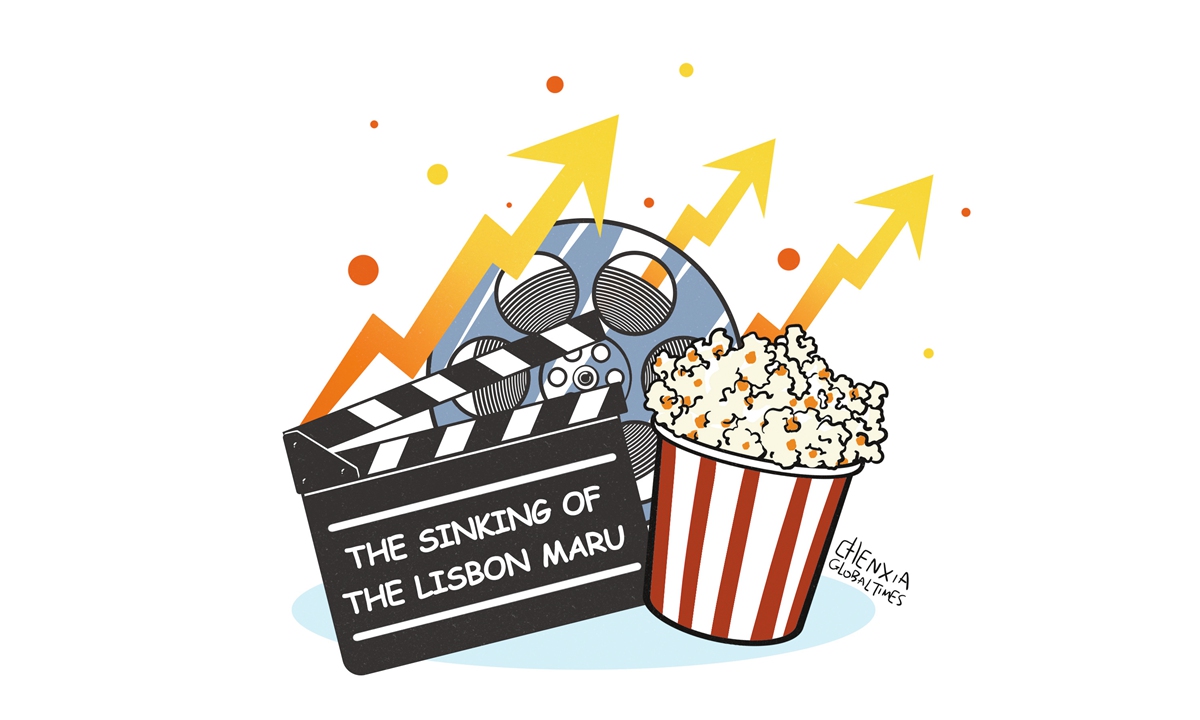
Illustration: Chen Xia/GT
During the Mid-Autumn Festival holidays, one documentary film
The Sinking of Lisbon Maru garnered widespread acclaim in China. The film not only recounts a relatively obscure episode of World War II but also serves as a vivid reminder of the cruelty of war and the bravery of ordinary Chinese people.
As of 3 pm Tuesday,
The Sinking of Lisbon Maru, which hit theaters on September 6, had earned more than 15 million yuan ($2.11 million) at the box office. The film has also earned a 9.3 rating on Douban, the Chinese equivalent of IMDb, with over 14,000 comments on the platform.
Without a doubt, the documentary film is experiencing a reversal at the box office thanks to its strong word-of-mouth. It just garnered 3,670,000 yuan at the box office on its release day. Looking back at the film's box-office performance since its release, this "sunken ship," which has been "salvaged," brings a historical truth that refuses to be buried, striking a chord with everyone who has watched it.
Despite the "disadvantage" of decreasing showtimes, as more and more people have connected deeply with its message and its portrayal of a little-known yet significant historical event.
At the heart of the story is the
Lisbon Maru, an armed Japanese cargo ship used during World War II to transport more than 1,800 British prisoners of war (POWs) from Hong Kong to Japan, without bearing a sign indicating it was carrying POWs - a violation of the Geneva Convention.
In October 1942, the ship was struck by a torpedo from a US submarine.
What followed was an unimaginable tragedy: Japanese soldiers sealed the POWs below deck, leaving them to drown and even shooting at them as they attempted to escape. As a result, 828 POWs died.
When the ship approached the coast of the Zhoushan Islands in East China's Zhejiang Province, 384 survivors were fortunately rescued by local Chinese fishermen, who risked their own lives using wooden fishing boats to save the British soldiers from the water.
At the end of the film, many audience members did not leave until they had read all the names of the 1,816 British soldiers and 200 fishermen who participated in the rescue.
This documentary serves as a memorial to their efforts.
This is not only a significant example of China and Britain fighting together against fascist aggression during World War II, but also a historical story of the deep friendship formed between the people of both nations.
However, for decades, the Japanese government has avoided addressing its role in the events surrounding the
Lisbon Maru.
The film's director and producer, Fang Li, an expert in geophysical exploration and marine technology, heard the story from some fishermen in Zhoushan, East China's Zhejiang Province in 2014 and later decided to make a documentary about it.
In an interview with the Global Times, Fang expressed the film's significance. "I made the film to reveal the truth, for the young men who died in the waters of the Zhoushan Islands and for the Chinese fishermen who helped rescue them," he said.
His determination has brought this story to light, despite the challenges of historical research.
The film's attention to historical detail is another reason it has resonated strongly with viewers.
Fang traveled extensively, conducting interviews with survivors, descendants of the POWs, and the families of the fishermen who took part in the rescue.
"The descendants of the fishermen who participated in the rescue back then told me during interviews that whenever their fathers mentioned the incident, they would always say, 'We just did what we were supposed to do.' When the descendants of the POWs spoke about that part of history, they expressed their gratitude and respect for the fishermen of Zhoushan," said Fang. "These heroic, brave, yet humble and modest ancestors deserve to be remembered."
His journey spanned multiple countries, including the UK, Japan, the US and Canada.
The result is a documentary that does more than recount the facts; it pieces together the fragments of history through the personal testimonies of those directly impacted.
According to Fang, they found more than 380 descendants of the survivors, interviewed over 130 face-to-face, and collected more than tens of thousands of historical photos.
In the film, as the survivors of the
Lisbon Maru, the families of the POWs, the fishermen who participated in the rescue, and relevant personnel from Japan and the US recount their stories, fragments of history are pieced together.
The realistic special effects in scenes vividly recreate the brutality of war, the cold-bloodedness of the invaders, and the heroic deeds of the Zhoushan fishermen.
What sets
The Sinking of Lisbon Maru apart is that it goes beyond the retelling of a wartime tragedy.
It emphasizes the love beyond borders: The courageous Chinese fishermen who, despite the risks, saw it as their duty to help others.
The story of the
Lisbon Maru, once nearly forgotten, is now being told to a new generation, ensuring that the ship's sinking - and the heroism of those who responded - will not be silenced.
The author is a reporter with the Global Times.
life@globaltimes.com.cn




